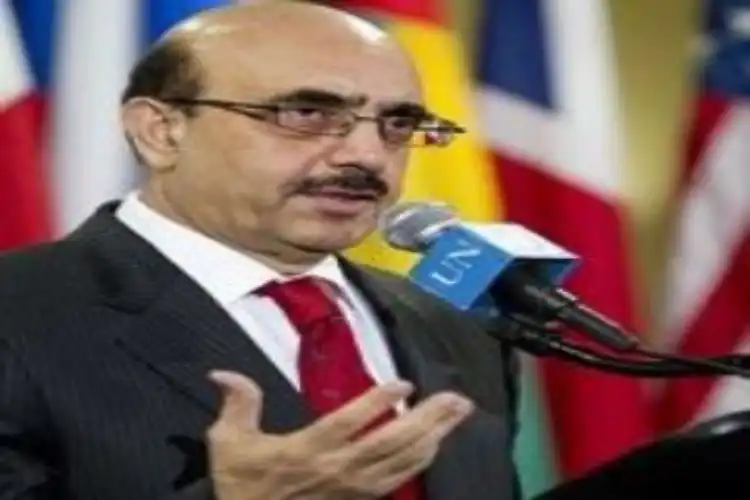
Shantanu Mukharji
Pakistan has perhaps not faced such humiliation in recent times as serious questions are being raised over the Ambassador-designate to the US Masood Khan, who awaits clearance from the US State Department for his posting. Serious allegations are raised against Khanand things only got hotter last week as Scott Perry, a member of Congress representing 10th district Pennsylvania, wrote a letter to President Joe Biden asking him to reject the appointment of Masood Khan for his connections with the terror groups and terrorists.
Perry has listed specific cases of Khan's complicity. These include his proactive proximity to the dreaded terror outfit Hizbul Mujahideen (HM) in stark and unsettling terms.
Nomination of such a tainted diplomat at the behest of Prime Minister Imran Khan, who should know well that Masood Khan is linked to the terrorists and had been encouraging terrorists to target the US and hence it reflects his mala fide and the extent of contempt that Pakistan holds for the US. There is sufficient evidence to suggest that Masood has been abetting youth in Kashmir for radicalization and exhorting them to take up arms to hit out at the security forces. There is also ample evidence on record that in 2017, Masood Khan had castigated the US for designating the HM leader for sanctions terming them as unjustifiable. Later in 2019, collaborated with Fazlul Rahman Khalil by appearing with him on the issue of Specially Designated Global Terrorist (SDGT).
It may be recalled that Fazlul Rahman is the founder of Harkat ul Mujahideen which is already declared as a foreign terrorist organization. This outfit and its affiliates had active links both with Osama bin Laden and Al Qaeda. Khalil was also a key member of the International Islamic Front which had issued a fatwa in 1998 calling for terror offensives on the US.
Further, the allegations include that Masood Khan has a perverse attachment to Islamic terrorism and is also supported by the most radicalized Jamat e Islami which is actively linked with Lashkar-e-Toiba (LeT) with the 26/11 terror assaults in Mumbai. The list of allegations against Masood is endless including the charge that in 2010, he had openly, and most indiscreetly called for the release of mass murderer Aafia Siddiqui and his acts are akin to the actions of a jihadist. With so many points against him surely does not qualify him to be an acceptable candidate as an Ambassador in the US and this is well articulated in the letter of Congressman Scott Perry who is vehemently opposing Masood’s posting to Washington.
The letter addressed to President Biden has set the tone in the US government circles, media fraternity, and the academia towards building up of a public opinion so that Masood’s appointment is shot down in the larger Geopolitical and security interests. Concerned quarters, meanwhile, state that Masood, though a Pashtun by birth, was President of the PoK during which he systematically cultivated Kashmiri terrorists and became radicalized to support them. This also led him to develop a pathological hatred for the US and, therefore, we see his hate speeches against the US which have never been politically correct or discreet. They were also conspicuously bereft of any diplomatic utterances and instead were more akin to jihadi speeches against the US which now Congressman Perry is bringing up with much hype. The US on its part seems to be moving cautiously by being indecisive since November last year when Masood Khan’s appointment proposal reached Washington. It looks like it’s paused for now.
Perhaps the US is weighing all the options very carefully as it doesn’t want to dump Pakistan in a lurch specialty to attempt and woo it away from the Chinese camp hence this delay. However, it must be borne in mind that Masood Khan held two postings in Beijing. One as a full-fledged Pakistani Ambassador from 2008 to 2012 and earlier as a junior diplomat. It’s also possible that he is doing things at the prompting of China as China and Pakistan are very close with China Pakistan Economic Corridor (CPEC) getting overriding priority and China and the US distancing each other due to Quad and Pakistan’s reluctance to leave the China camp and warm up to the US. Masood Khan’s case under reference may be a test case. The US doesn’t seem to be in a hurry and is moving with abundant caution. Whatever, notwithstanding the Masood case, it will not be so simple and easy for the US and Pakistan to put their bilateral ties on the rails which stand more impaired after the US pullout from Afghanistan in August last year.
On part of the US, it is evident like all the other western countries, the US is skeptical about the threats of Islamic terror and it is rightly apprehensive that if Masood Khan is given a go-ahead, he might be an encumbrance to the US security system. Instead of regular discharge of diplomatic responsibilities, the Ambassador may indulge in duties incompatible with his diplomatic status. This might also embolden the passive jihadis present in the US and its periphery link up with Masood Khan who is known to be ensconced with huge sympathy for the terrorists. Will the US take this calculated risk? Analysts feel it should not.
(Writer is a retired IPS officer, a security analyst, and a former National Security Advisor to the Prime Minister of Mauritius. Views are personal)
